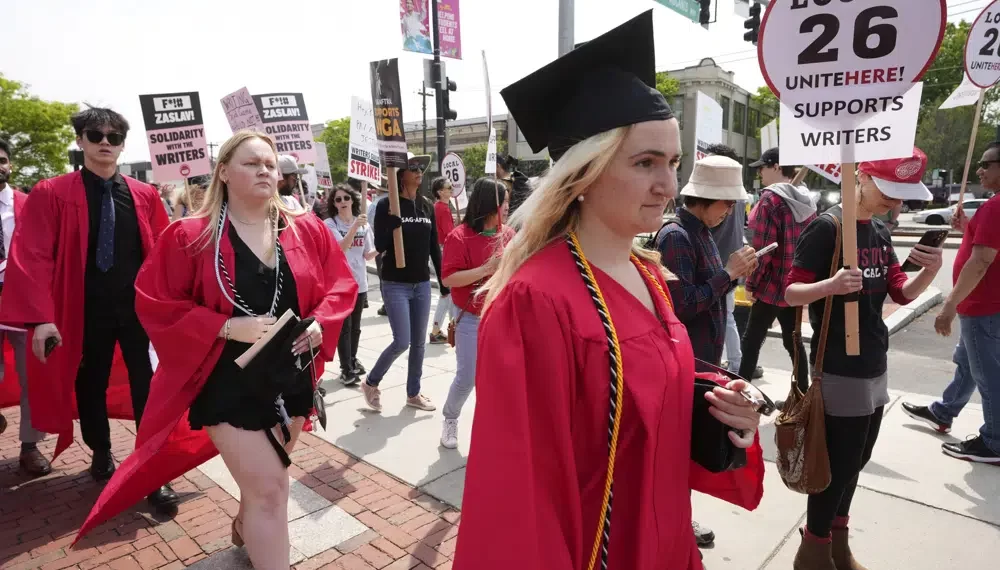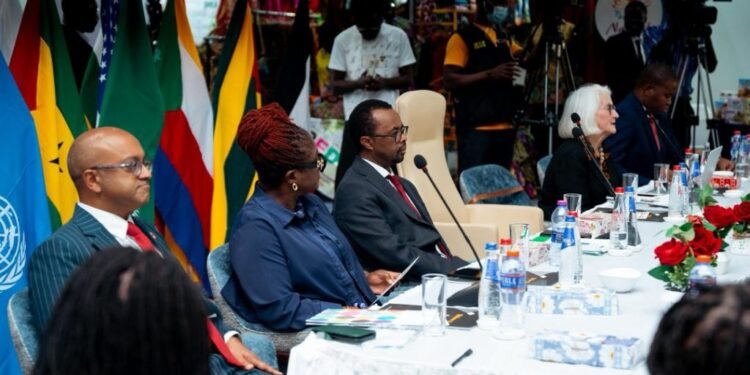Scores of Boston University students turned their backs on the head of one of Hollywood’s biggest studios, and some shouted “Pay your writers”, as he gave the school’s commencement address Sunday in a stadium where protesters supporting the Hollywood writers’ strike picketed outside.
About 100 protesters chanted “No wages, no pages”, waved signs, and were accompanied by an inflatable rat outside Nickerson Field as David Zaslav, president and CEO of Warner Bros. Discovery, gave his address inside the stadium. Thousands of graduating students, family members and educators attending the graduation ceremony had to walk by the protesters to enter the stadium.
Above the stadium, a small plane flew a banner that read, “David Zaslav — pay your writers”.
Kim Caramele, a writer and producer from North Stonington, Connecticut, said she hoped the protesters’ presence at the graduation ceremony helped give students a different perspective on what they should value in life.
A winner of Emmy and Peabody awards for work on her sister’s show, ‘Inside Amy Schumer’, Caramele said:
“The writers being here today can help show the students that wealth is different than good”.
Kim Caramele
Inside the stadium, scores of students wearing red graduation gowns stood up during Zaslav’s speech and turned their backs on him. Other students booed during his speech and shouted in support of the striking writers.
Zaslav, a graduate of the university’s law school in the mid-1980s, was a contentious pick, with many alumni taking to social media with their objections.

In a statement after the event, Zaslav said:
“I am grateful to my alma mater, Boston University, for inviting me to be part of today’s commencement and for giving me an honorary degree, and, as I have often said, I am immensely supportive of writers and hope the strike is resolved soon and in a way that they feel recognizes their value”.
David Zaslav
Saying the rise of streaming has hurt their earning power, about 11,500 members of the Writers Guild for America walked off the job at the beginning of May, after talks on a new contract broke down, and they haven’t returned to the negotiating table since. It’s the first writers’ strike — and the first Hollywood strike of any kind — in 15 years.
The union is seeking higher minimum pay, more writers per show, and shorter exclusive contracts, among other demands — all conditions it says have been diminished in the content boom driven by streaming.
The Alliance of Motion Picture and Television Producers has said that it had offered “generous increases in compensation for writers as well as improvements in streaming residuals”, including the highest first-year wage increase in a (Writers Guild for America) WGA contract in more than 25 years, and the creation of a new category of rates that would mean a new, higher minimum for mid-level writers.
Why Hollywood writers are striking and the immediate impact

The union representing 11,500 writers of film, television, and other entertainment forms is now on strike. Here’s a look at the storylines the fight has spawned.
Streaming and its ripple effects are at the center of the dispute. The guild says that even as series budgets have increased, writers’ share of that money has consistently shrunk.
Streaming services’ use of smaller staffs — known in the industry as “mini rooms” — for shorter stints has made sustained income harder to come by, the guild says. And the number of writers working at guild minimums has gone from about a third to about half in the past decade.
The guild said in a March report:
“On TV staffs, more writers are working at minimum regardless of experience, often for fewer weeks”.
The Writer’s Guild
The lack of a regular seasonal calendar in streaming has depressed pay further, the report says. And scheduled annual pay bumps under the current contract have fallen well short of increases in inflation.
The weekly minimum for a staff writer on a television series in the 2019-2020 season was $4,546, according to industry trade outlet Variety. They work an average of 29 weeks on a network show for $131,834 annually or an average of 20 weeks on a streaming show for $90,920. For a writer-producer, the figure is $6,967 per week. Writers of the comedy-variety show for streaming have no minimum protections at all, the guild says.
Late-night talk shows, heavily dependent on same-day, current-events-based comedy writing, were the first to feel the strike’s effect. The shows have been the de facto frontline during previous writers’ strikes. NBC’s “The Tonight Show Starring Jimmy Fallon,” ABC’s “ Jimmy Kimmel Live!” and CBS’s “The Late Show With Stephen Colbert” all went immediately into hiatus and will air reruns.
READ ALSO: Hajia4reall’s Arrest: Soprano Blames Mahama, Akufo Addo























